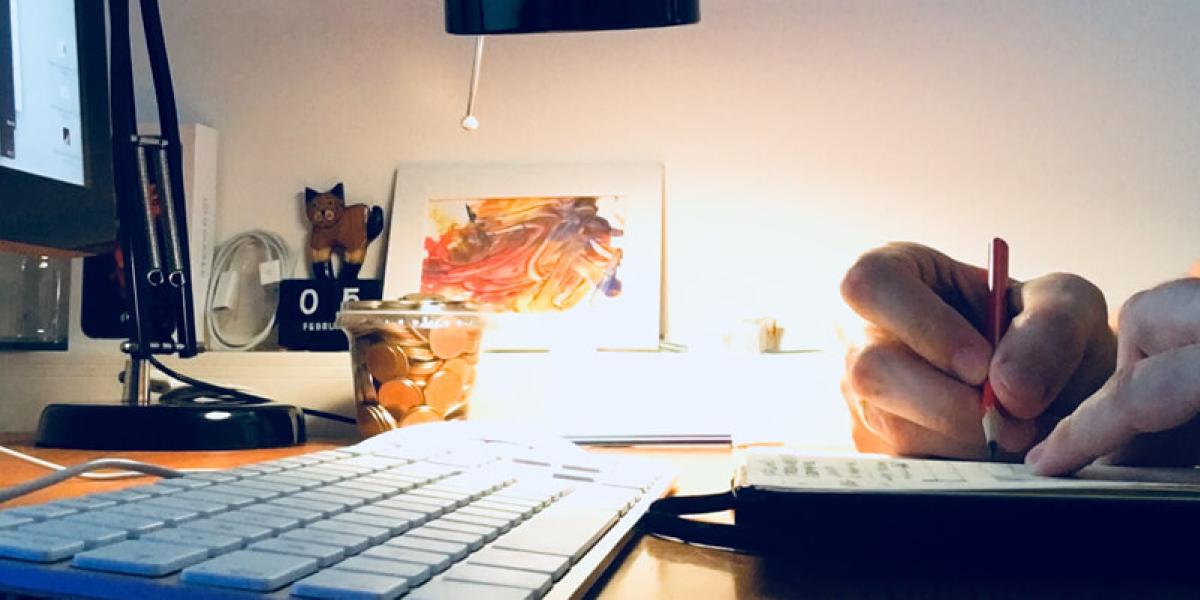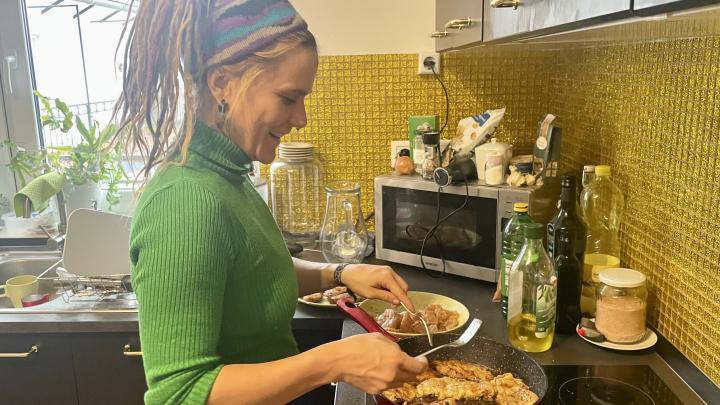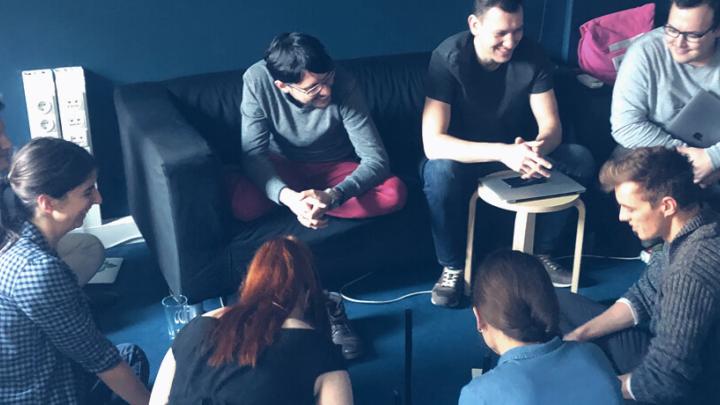
In my previous article, I talked about positive emotions on corporate wellbeing. Now I will focus on the flow experience.
It was in seventh grade that math split into algebra and geometry. I found the latter magical. We were given problems that my dad and I often spent hours hunched over solving, competing to draw the helper lines to prove the hypothesis. I enjoyed what was, for many of my classmates, an agony. It was the same experience as playing chess together: concentration, reflection, relaxation.
For six years, I tormented my surroundings with the violin. It didn't occur that I didn't have to do it, so I just pulled what was put in front of me. I was embarrassed by my inability to intonate beautifully, and I admired the higher years, how the same sound would come out of their hands full and vibrated. At the end of my sixth year, my violin teacher showed me how to do this at my request. At the time, I hadn't read Csíkszentmihályi and didn't know how to achieve the flow experience. Four of the eight conditions were met:
(1) I named the goal (mastering vibrato technique),
(2) I got feedback during the practice (I could "shake" my hands better and better, and I could hear and see it all the time),
(3) the goal I set was not far off; as soon as I started practicing, I had resulted in a few days,
(4) I knew what I needed to focus on (I leaned the end of the violin against the wall to keep it from moving in my hands due to the initial rough movements).
I learned the technique in a few weeks, and everything made new sense.

Blogging is one of those activities where the level of challenge is just the right balance for my skills. When I start on a new blog post, I put on the flack and struggle with the text for hours, then call in the team to comment on what I've put together in a collaborative document. It's at times like this that I get the thrill. Often it hurts to let go of entire paragraphs; other times, I find it particularly difficult to rephrase a misplaced sentence. In the meantime, I enjoy the new perspectives that give the text a unique quality. With headphones on, I block out my surroundings with mostly monotonous music (e.g., Psytrance). After a day like this, I go home tired and satisfied. I feel that my effort, with the contribution of others, has contributed to my personal growth. That is euphoria for me.

Experience has shown that the best way to get into a flow state is to build on and use your strengths. Everyone has a skill that they are the best at in the team. This competence is the greatest asset you can contribute to your company's growth.
Far from over-formalizing anything, we have now got to the point where we are looking again and again at the roles we use and trying to work out who is living up to their responsibilities with what emphasis. Because of individual differences, roles may differ in how each person interprets them. This, in turn, creates functioning teams or pairs where competencies rather than roles dictate the roles. Because strengths provide the focus, this direction leads to more robust engagement, as if a consultant had figured out what the model was to be aligned with
For immersion, we need protected, safe environments. Established habits maintain safety. One of our most essential habits is borrowed from Scrum. We work in two-week iterations. Everyone can decide where, when, and how to implement their commitments during the operational period. On the tenth day, we stop and reflect on the active period, and after a wrap-up, we launch the next period. This rhythm facilitates reflection. It discourages ad-hoc work. The two-week iteration has a beginning and an end. The rhythm provides security. And the result at the end of the two weeks gives confidence.
Everyone achieves and maintains a state of flow differently. There is no silver bullet. It takes all our strengths and talents to experience the world in a state of flow.
Related literature
Martin Seligman: Flourish - Be Happy!
Seligman is the father of positive psychology, the "discoverer" of intellectual inertia, and the creator of the well-being model. In his book, he draws a five-dimensional map that can then delve into each of these topics in-depth: positive emotion, flow, impact (meaning), relationships, performance.
Mihály Mihály Csíkszentmihályi: Flow - the flow. The psychology of the perfect experience.
This is the Flow book that every connoisseur should read.
Contrary to popular belief, the best experiences of our lives do not come to us in a passive, receptive state. [...] The most beautiful moments usually come when one pushes his physical or mental performance to the limit with a solid will to accomplish some difficult but essential task (Mihályi Csíkszentmihályi: The Current, p. 22).
Mihály Mihály Csíkszentmihályi: Good business
Title: Leadership, Flow and the search for life.
One of the underlying messages of the book is that the flow experience is the result of above-average challenges and the application of high-level skills. Suppose you want to immerse yourself in the flow experience. In that case, Csíkszentmihályi says, don't seek out overly complex situations initially because that creates an experience of anxiety too early on, which is hard to get out of. A better direction is to start with more straightforward tasks and gradually move from the comfort zone towards higher challenges.
My favorite chapter is "What are great souls made of?" in which the author explores what individuals who radiate drive and can combine their personal goals with goals beyond themselves have in common. He highlights five factors: boundless optimism, integrity, ambition, curiosity, and empathy.
Perhaps this optimistic appreciation of life makes it so easy for these leaders to find flow in their work, forgetting themselves in the pursuit of new tasks. From the point of view of many life-weary scientists, this attitude may seem childishly naive. But it seems to work, and such people can enjoy life and work to benefit others. Too bad we don't know how to enrich our lives with more (Good Business, p. 165).
Mihály Mihály Csíkszentmihályi: The Art of Joy
There was a surprising observation by Csíkszentmihályi about the extent to which the experience of flow in the workplace can be transferred to everyday situations. One would expect to a large extent since this is a question of quality of consciousness, not a rate that depends on the object of the activity.
Well, the situation is more nuanced than that. There seems to be a little crossover between the two life-spaces, i.e., it may not be possible for the same person who has otherwise developed this to a high level in their work to experience flow while spending time with family.
It seems easier to achieve flow at work than in every day, sustaining activities (raising children, doing chores around the house). In a good cause, we work to achieve our goals, and colleagues, clients, and other business contacts keep giving us feedback when we succeed. Therefore, the work environment is much more conducive than the home environment to creating the focus that is a prerequisite for a streamlined experience.
This book is about how we can create situations in our everyday lives that are conducive to the experience of flow.
Mihályi Csíkszentmihályi: The Paths of Development
The subtitle of this book is no small feat: "The Psychology of the Third Millennium."
Socio-anthropological analysis of the role of flow. This book will not disappoint those who love Dawkins' selfish genes and can immerse themselves in László Mäger's musings; this book will not disappoint. In any case, it's worth noting that this is not a practical guide to the current experience.
In this book, Csíkszentmihályi attempts to define the evolutionary role of flow. He argues that memetics can provide answers to many questions about flow experience. Our minds like to drift towards the path of least resistance: the less effort it takes to maintain a meme, the more inclined we are to give it space. For example, watching TV doesn't provide long-term pleasure, yet we spend a lot of time in front of the screen because we are served information in a stimulus-rich environment with minimal effort. We passively consume the visual and audio material we have digested, and in the process, we do the least to stimulate our cognitive system
Csíkszentmihályi says that if we want to have a stream-of-consciousness experience often, we should strive to have complex experiences that move our bodies, emotions, and thoughts as often as possible.
If we don't do this in the small things, it will be challenging to learn how to consistently steer the evolution of memes in the right direction in the more critical cases. [...] We must remember that every time we give our attention to an idea, a written word, a sight, or buy something, or do something out of some conviction, we are constantly changing something in the fabric of the future, even if only in a small way (Paths of Evolution, p. 211).
Mihályi Csíkszentmiályi: Creativity
Title: Flow and discovery, or the psychology of ingenuity.
My favorite author in the field of creativity is Edward de Bono. I was curious to pick up Csíkszentmihályi's book on the subject, and I was not disappointed! However, in this book, he expounds on several themes that he has already explored in his previous works. I recommend it only to those who have read the last four books and cannot get enough of Csíkszentmihályi. Perhaps artists might find this the only reading from the father of current psychology: they can learn all the essential aspects while keeping creativity in focus throughout.
It is only after we are out of the flow state, at the end of a stage or in those moments when we are distracted, that we can surrender to a feeling of bliss. And of course there are times when the creator is overcome with a feeling of happiness, of satisfaction, after the poem is finished or the theory is proven. In the long run, the more we experience the flow in everyday life, the more likely we are to be happy [...] The relationship between flow and happiness therefore depends on how complex the flow is, how it leads to new demands and thus to personal and cultural fulfilment (Creativity, p. 131).
Mihályi Csíkszentmihályi: Talented children - Flow in school
It is a very important and fascinating question how the flow experience is manifested in children and how we, as adults, influence its development.
In this book, Csíkszentmihályi looks at how personal, social and cultural conditions influence the development of talent. The development of talent is influenced most fundamentally by genetic background. First and foremost, we need to look at what our children are receptive to, through which senses they perceive the world most, and what they are interested in. Family influence is crucial in whether these basic drives are set in motion on the path of development.
Three factors help talent to develop: knowledge, motivation and discipline.
Most people, unfortunately, are unable to spot interesting tasks and develop their skills. In our modern culture, adults seek passive relaxation, despite the fact that they feel better when they have some challenging tasks. Adolescents and adults alike spend most of their free time in undemanding pursuits such as watching television, even though they feel passive and dissatisfied. These suggest that autotelic personality traits are necessary for a young person to try to excel (Talented Kids - Flow at School, p. 121)
A few points about gifted adolescents:
-
A gifted adolescent's abilities should be recognized and considered useful in the appropriate field of study.
-
Talented adolescents are capable of hard work, but are also open to new experiences, and the usual gender differences do not apply to them, but they are better prepared to keep their interests alive and expand them.
-
They develop productive life habits of spending more time than average alone or with their families, less time socialising and more time doing useful activities with peers; they use their attention sparingly and devote more time to developing their talents.
-
Their sexual behaviour is more conservative than that of their average peers, and so they can keep somewhat aloof from the turbulent changes of adolescence.
-
Talented young people with integrated and differentiated family backgrounds feel better about themselves during useful activities and do better in school.
-
Talented students are highly influenced by teachers who are supportive, like the autotelic family, while encouraging their students to absorb new knowledge and grow.
-
The development of talent is fostered by immersive activities that require emotional and more tangible stimuli, as well as the momentary enjoyment of the activity and a focus on long-term goals. The activities of students who are committed to developing their talents are not characterised by an overemphasis on any of the incentives.
-
Commitment to developing talent is influenced by whether the student has a perfect experience (334) while engaged in an activity related to exceptionality.
On the topic of gifted education, this book is unique! A recommended read for parents.
Howard Gardner, Mihály Csíkszentmihályi, William Damon: Good Work
It is perhaps undeserved that the book Good Work has been pushed to the back of the queue. How, for whom and what do we work for if we want to have ethically defensible results based on positive values? Together with her two co-authors, Csíkszentmihályi seeks to answer the question of what strategies enable people to preserve their moral and ethical values in today's marketplace.
The researchers studied two professions: geneticists and journalists. The former because, in their case, the noble goal of improving people's quality of life by maintaining their health is perhaps clear. And the latter because it is a sufficiently precarious profession with unclear ethical boundaries. We live in times when the profession of journalism is blighted by doubt and confusion.
In examining the professional realms, it was only after the fact that it became clear that genetics and journalism were sharply, almost diametrically opposed cases. In aligned genetics, the pursuit of good work is relatively unproblematic; in unaligned journalism, obstacles to good work are constantly cropping up (good work, p. 19).
Share with your friends!


